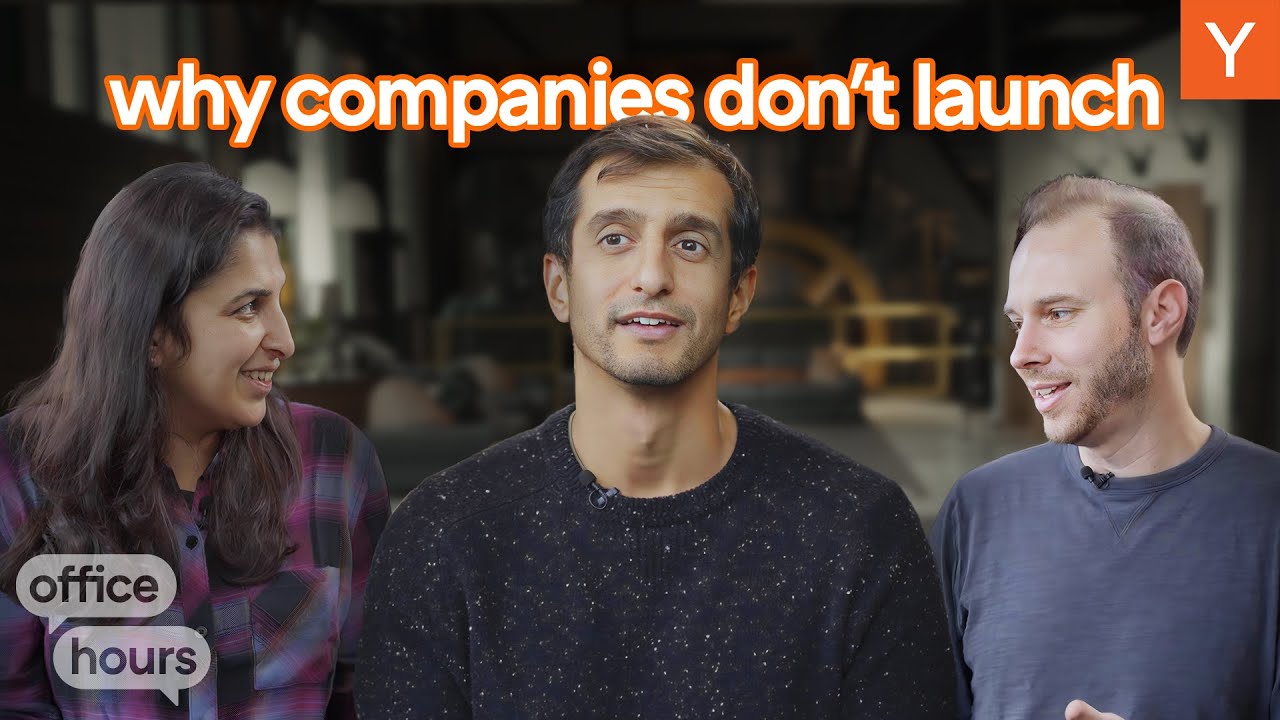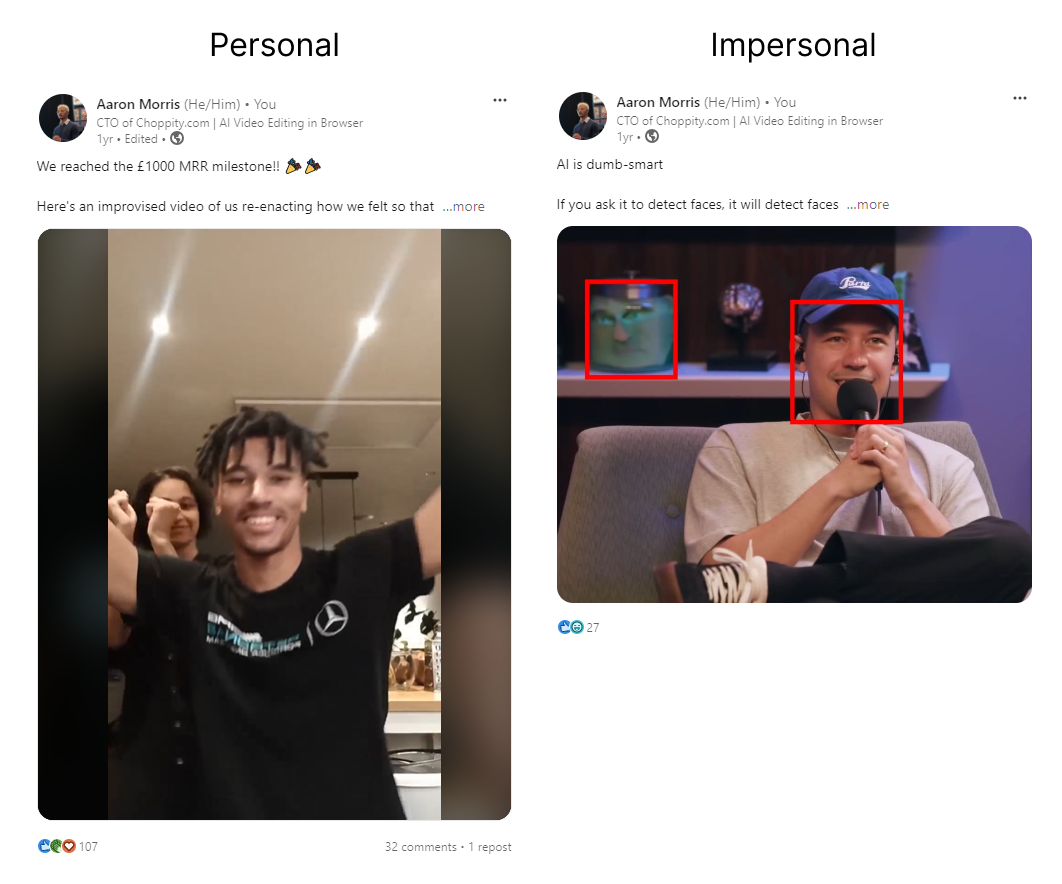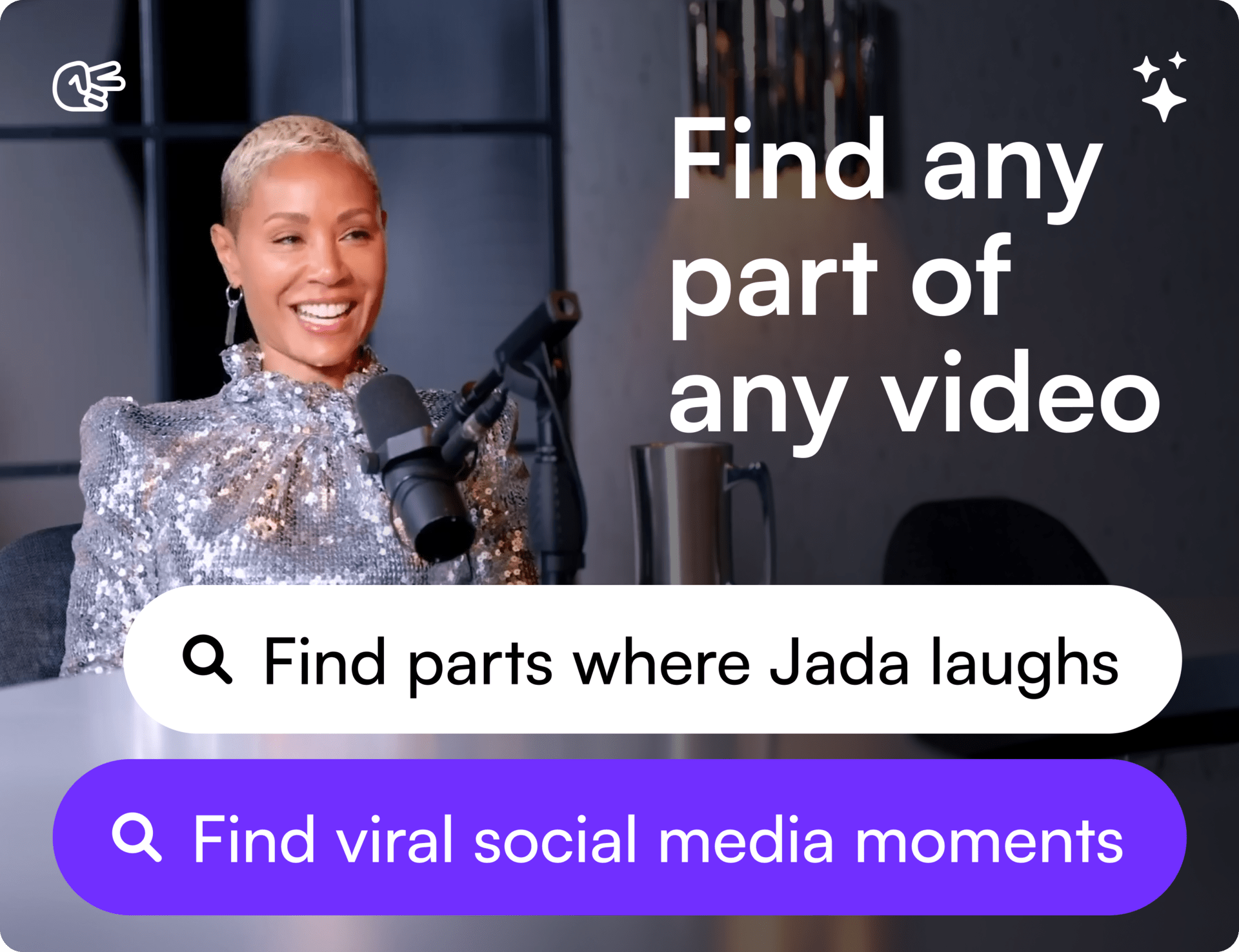We reached $10,000 MRR as 2 founders - 4 VITAL tips I give early stage founders

I get asked for early stage startup advice quite often. I've recently been helping a friend with his own startup. My friend went from 0 to 5 customers in a week. Here are the most useful tips which helped him.
Btw, if you're curious what a $10k MRR AI SaaS product looks like, you can check out our most recent launch here.
Also, if you want more early stage tips, I wrote this IndieHackers blog post when we were at £117 MRR. I hope it helps :)
1. "Everyone's advice is, 'launch a bad MVP ASAP', but how can I do that and still get customers?"
It's pretty common startup advice to launch an MVP as soon as possible. Btw, if this is new to you, here's a video with Y Combinator's version of this advice:

But here's the problem - if you launch super early, your MVP will suck by definition.
And this can make it really hard to acquire your first customer or even the first few customers.
Here's a repeatable method on how to solve this problem:
- Identify a problem. Remember, customers buy SaaS products because they have a problem. Identify one, very specific problem
- Outreach. Reach out to people manually via LinkedIn who are likely to have this problem (Btw, I explain further down why I believe it's vital to use LinkedIn instead of email). Set up a call.
- Relate on a personal level. During the call, find out about the person and get to know them. Tell them about yourself too. This turns you from a "random stranger on the internet" to a person that they know and trust.
- Explain why your goals are aligned. For example, "My goal is to help people like you solve this problem. If I solve this problem for you, it will improve your life, and it helps me start my business. That's why I'm so keen to do a good job". This way you ensure that potential customers know that you are on their side, you're not just trying to sell them something. This is where you can use being a startup to your advantage - you're obviously not just a sales person from a large corporation.
- Ask them to join the journey with you. Don't underestimate how powerful a story is. People love supporting others and helping them achieve their dreams. We knew most of our early customers personally and they liked us as people.
- Give them a personal guarantee of solving their problem. I found this to greatly reduce hesitation around purchasing. You're a new startup, you know your product is bad, and so do they. However, at this point they should have some trust in you. Almost all problems that SaaS products solve can be solved manually by you. Therefore, if you say to them, "Yes, I'm building a product, but if it doesn't solve your problem, I promise to do it manually myself" it should turn their purchasing decision into a no-brainer.
- Treat that customer like royalty. If you give the personal guarantee, you'll soon realise that doing 10 hours of manual work for a $20/month subscription sucks. I know, I've done it. In fact, it will suck so much that it will force you to focus on the hardest and most annoying parts first. Therefore, with continual communication with your customer, you will learn exactly what that customer wants and that will fuel your product roadmap. So, go above and beyond because remember if they leave, you're back to 0 customers.
- Avoid the "Solution in Search of Problem" situation. Over time, your MVP will improve to where you can do less and less manual work and you can be confident that you are building a product which actually solves a problem.
(P.S. taking this concept to it's logical end conclusion - I often argue that you don't even need an MVP to get your first customers. This is known as the concierge MVP approach.)
2. Become friends with your potential customers
Often when you ask founders, "how did you get your first customers?" they'll say "Oh, my first customer came from my network".
When I started, I didn't have a network, so this concept sounded like a holy grail to me.
However over time, I attend industry events and conferences and just made some friends! We talked about our goals and ambitions, I supported them and they supported me. A few weeks later, I realized that I actually had a decent network and many of those people were potential customers.
Think about how hard your close friends will root for you to succeed. It's ideal if your early customers are your friends. At the start, your product will be bad and your friends will be way more forgiving about bugs and issues.
This is me with a friend I made at the very start of my journey!

3. LinkedIn, LinkedIn, LinkedIn
We found all of our early customers via LinkedIn.
Here are my learnings about why I think LinkedIn is better than email for cold outreach:
- Trust - If you build a network and post somewhat regularly you will have a visibly active profile. Therefore, when somebody opens your cold messages and goes straight to your profile (which people usually do), they will get a feel for who you are as a person. Here's my LinkedIn if you want to see my earlier posts for examples (feel free to connect with me btw).
- Prospecting - It's extremely easy to find potential customers. Once you've found the first potential customer, you can look through their posts and recent comments to find other people in their network/industry. You'll quickly become overwhelmed by the number of tabs you're opening! We didn't even use LinkedIn Sales Navigator or any other outreach tools.
- Response rates - It's slightly harder to ignore a cold message that you receive via LinkedIn. When you message someone on LinkedIn, they see your face, so it feels more personal. Ignoring an email is easy because it's easy to ignore that there is a person on the other end who sent it.
- Personal - Your message comes with a "face" and an identity attached. Nobody likes receiving a cold email. It's faceless. We don't trust the person by default
- Think about your own actions - When did you last reply to a cold email? Or even read one? Probably never. What about LinkedIn?
- Spam filters - It's extremely easy for your emails to be flagged as spam and never be seen. With LinkedIn, you can still get shadow banned if you go crazy with outreach, but as long as you're reaching out to the right people and staying relevant you have a better chance of having your messages seen.
Try this test yourself
I personally found that posting about business all the time gets dull after a while, and it doesn't build a personal brand. At the end of the day, people care about people.
If you received a cold message from 2 accounts and one was filled with "Personal" posts and the other was filled with "Impersonal" posts, which one would you reply to?
Maybe it seems overly simplistic, but this is the reality of how people make decisions and it will absolutely affect your cold outreach response rates.

I'd recommend doing this same test with your own profile. Note, if it feels like a lot of effort to post in this way, remember that realistically you only need 3 or 4 posts like this on your profile to give a friendly impression.
Also, remember, you're not necessarily going for crazy high engagement rates, you're building your profile for the purpose of outreach.
4. Do the hard part, it feels awesome when it pays off
I'm a tech person, I like coding. Learning to send cold messages and have these kinds of conversations wasn't easy. So if you feel that way, you're not alone in that. I spent years building products and not talking to people about them because ultimately I was afraid.
Unfortunately at the end of the day, if you're trying to build a profitable startup, a great product that no one knows about will have 0 revenue.
How can I help my friend more?
I want to help my friend more on his early stage startup journey, however I only know my own experiences.
Do you have any tips of your own that I can share with my friend? Or opinions on what I wrote? This is a genuine ask, I will be replying to every single comment.
My contact details
If you want to see what I'm working on, here's our product hunt launch.

I have a great mentor. That mentor's only condition for helping me was that I would also help others.
If you want to reach out or ask me for advice please do:
- My LinkedIn is: https://www.linkedin.com/in/aarvn/
- You can find my email here

I love what you wrote about linked in > email. It's really easy to build up a profile with linked in and make yourself a trusted credible source, email is so much harder (to be fair we haven't spent much time warming up our email)
Hey, I'm very glad you agree! And yeah, email definitely feels like something you have to focus on to get right!
About "personal" and "impersonal" posts, I don't quite get it. I definitely find the right one ("impersonal") more interesting. I guess it's because my Twitter timeline is already full of posts like "l made Xk MRR in Y months" 😅
Well I think I am sending connection request to the wrong person